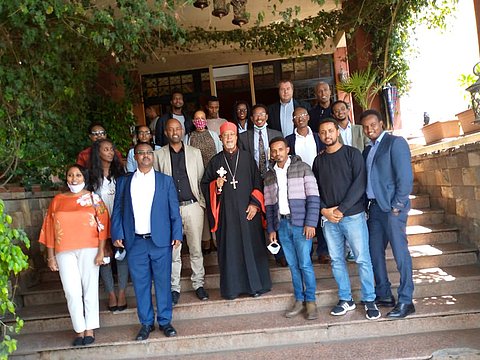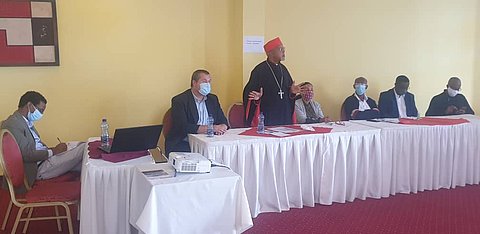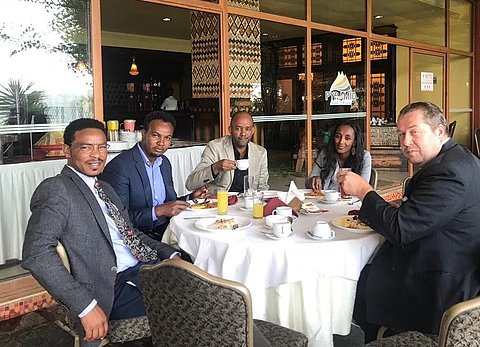The last KASHA Annual Seminar in May 2019 already dealt with ethnic conflicts in Ethiopia, which had broken out all over the country since Prime Minister Abiy Ahmed took over the government. This led to large-scale displacement and internal migration. At that time, the seminar took place in the old imperial city of Gondar with the participation of a delegation from the German Bishops’ Conference.
This year, the KASHA seminar had the wonderful backdrop of the lakes around the city of Debre Zeit (Bishoftu) as a conference venue and was dedicated to the question of “Identity and Conflict – The Role of Faith, The Role of the Church”. The first speaker was Dr. Marko Kuhn, who put forward seven theses on the subject of identity and conflict and
compared them with theological considerations, above all with the principles of Catholic Social Teaching. The Archbishop of Addis Ababa and Chairman of the Ethiopian Reconciliation Commission, Cardinal Berhaneyesus Demerew Souraphiel, then specifically addressed the situation in Ethiopia. He spoke about “The Experience of the Catholic Church and Religious Actors in Peace and Reconciliation in Ethiopia”. His many years of experience in peace building has shaped him in the border conflict between Ethiopia and Eritrea as well as in the ethnic conflicts and expulsions of recent years. He also reported on the difficult status of church actors in the worsening war between Ethiopia’s central government and the leading party in the state of Tigray (TPLF). This bloody conflict, driven by the worst atrocities, shaped the seminar throughout. The larger part of the input from KAAD Alumna Fitsum Assefa also dealt with this. Ms. Fitsum is Minister for Development in the central government in Addis Ababa. She still knows some of the alumni from her days as a PhD-student in Germany and has already served one term in her ministry. After the recent elections, Prime Minister Abiy called her back into the new cabinet.
The importance of the topic of identity (politics) and conflict is shown in an extreme way on today’s war front in Northern Ethiopia: Discrimination and trivialization of discrimination induce frustration and anger. This leads to further ethnic chauvinism and an ever-turning spiral of hate. Mechanisms such as dehumanizing speech, radicalization, demagogy and strong totalitarian tendencies emerge all over. A great concern can be felt everywhere in the country that this conflict is spreading and that the already fragile building of the multi-ethnic state of Ethiopia could be completely eroding. Comparisons are made with the genocide in Rwanda or the civil wars in Yugoslavia and warning voices are raised.
The side of the central government (and with it a large part of the population) feels itself to be treated unfairly by a one-sided international community (especially by the press) since the beginning of the war and has insisted on non-interference by external actors. The people in Tigray, on the other hand, feel less and less that they are still Ethiopians while becoming increasingly radicalized. This plays into the cards of the local forces that are driving conflict and secession.
The seminar in Debre Zeit / Bishoftu was very in-depth and valuable because it discussed and raised awareness of basic mechanisms of ethnic-identity conflict.






